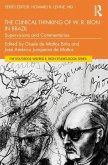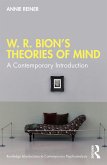These four discussions held by Wilfred Bion with a small group of psychiatrists and psychotherapists in Los Angeles in 1976 were first published in 1978, edited by Francesca Bion. Despite its brevity the book covers in a very accessible way the main features of Bion's model of the mind and his view of the psychoanalyst at work. It therefore provides a useful introduction to his thinking, whilst the vitality of the exchanges demonstrates the creation and operation of a genuine 'work group' .This new 2019 edition also includes an introduction to Bion's model of the mind and glossary by Meg Harris Williams.
Hinweis: Dieser Artikel kann nur an eine deutsche Lieferadresse ausgeliefert werden.
Hinweis: Dieser Artikel kann nur an eine deutsche Lieferadresse ausgeliefert werden.








